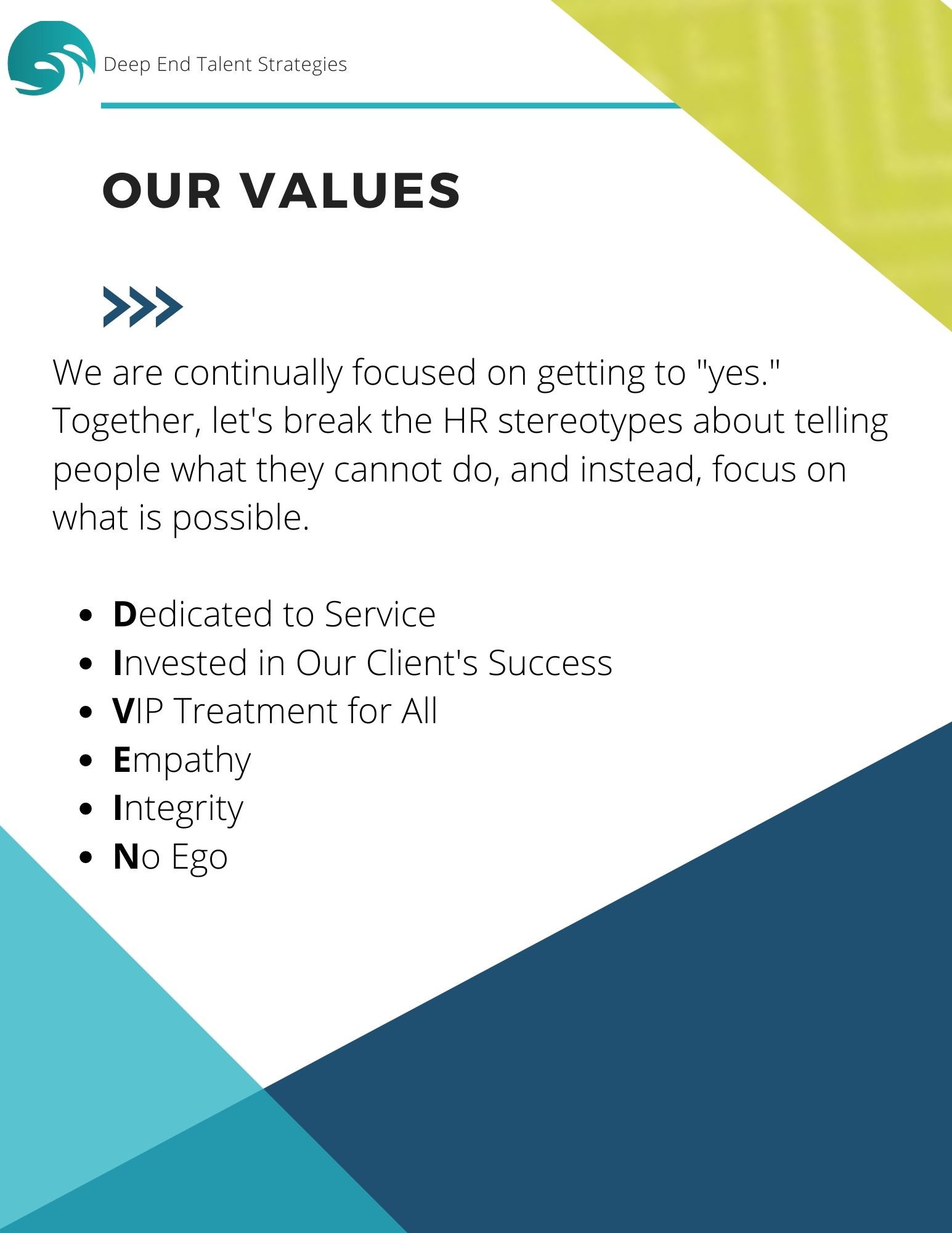Mission, Vision, Values: Vital North Star Or Just Fluff?
Here when and why we created them and learn tips for revisiting these for your business. Link to a free template at the bottom!
Does your company have a mission statement? Vision statement? What about company values? And tell the truth-do you think they are necessary or cliché? I have been on both sides of that fence. Let's talk about the What, Why, and How of writing these for your business.
I have also been continually torn between whether they should be aspirational or reflect the current state. Over 23 years now in the business world, I have landed on "yes." Yes, they should be aspirational, and yes, they should reflect your current state if you're actively working towards them.
Yes, they can be cliché, and yes, they should serve as a north star for the business.
Benefits and outcomes to stated mission, vision, and values
- Barometer for new products and services
- Sets clear expectations for candidates and current employees
- Identifies target behaviors for performance, coaching, development, and advancement
- Establishes a shared language
- Guides desired behaviors and helps articulate performance feedback
- Tells the public who you are and what you do
- Defines target audiences
And since we established that there are two sides of this fence, here are some risks to putting these on paper.
- They only exist on paper (or a plaque in your lobby)
- Tolerate contradictory behaviors
- Recognition and rewards are inconsistent
- Leaders do not reinforce them
- Employees do not know them
- Customers do not know them
- They are not used to filter out services or clients
- Not tied to recruiting or other talent management programs
Shortly after founding Deep End Talent Strategies, I saw a social media post that another HR consulting firm had published a new mission statement. I almost succumbed to ISDTT (I should do that, too). Whether I simply did not have time or talked myself out of, I don't fully recall.
DETS went for over a year beyond that point without a written mission statement or company values. The vision was simply to survive as a new business-which is far from aspirational, and I was embarrassed to write that down.
We had a handful of contractors working on special projects over that first year, but when I posted a job for our first full-time employee, the stakes felt much higher. All employees needed to be aligned with not only what we do but how we do it.
I wasn't necessarily trying to pen a mission statement at that point, but I wanted candidates to know going into the application process what I value and why we exist. Here is an excerpt of that job description, which became our Mission.
Our clients may be smaller businesses and nonprofits, yet we believe their HR processes and talent management programs should be best in class. Our individual clients may be currently out of work, yet we believe they are capable of greatness and are committed to helping them achieve their dreams.
We did find a phenomenal first hire, and then I thought, how do I onboard them to articulate what I will continually point to in terms of how I need them to show up for the company and our clients? I reflected on what past clients have said they valued, and these became our Core Values. *Bonus that I could arrange the words in a slightly different order to get them to spell DIVE IN!
Deep End Talent Strategies has six core values that drive our business. These values are reflected in our employment practices and form the foundation for our employee and customer experiences.

Write a mission, vision, and/or values when the time is right, not because someone else did or someone told you it was a good idea. When you are ready to write these for the first time or revisit them, please borrow our compiled questions to get started.
- Who does your product serve, and how do you make an impact?
- What does your product/service allow people to do? What value does it provide?
- Where do you have the most significant impact?
- When does your solution have the greatest impact?
- How do you work?
- How do you know your solution is working?
- Why do you do what you're doing?
- What makes your company and solution different?
- What's the essence of your strategy?
Begin to think through these questions and then solicit input from your team, customers, vendors, and all you serve. Then what? Once you have put in the work to write or update your mission, vision, and values- please fight for them rather than shoving them in a drawer or engraving another plaque. These should be living, breathing elements of your culture.
- Enroll your leadership team in the mission, vision, and values
- Hold leaders accountable for leading by example
- Communicate them to employees; intentionally look for ways of reinforcing them
- Align them with HR and talent management programming
- Recruiting and interviewing
- Performance management
- High potential identification
- Learning and development
- Compensation, promotions, and rewards
Keeping your mission, vision, and values top of mind for everyone is the key to allowing these to serve as a north star for the company. The opposite is how they have become cliché in too many organization.
We are here to help. Download a free guide to write or rewrite your mission, vision, and values.
Shawna Lake is the Founder of Deep End Talent Strategies, and she finally said "Yes" to a Mission and Values.